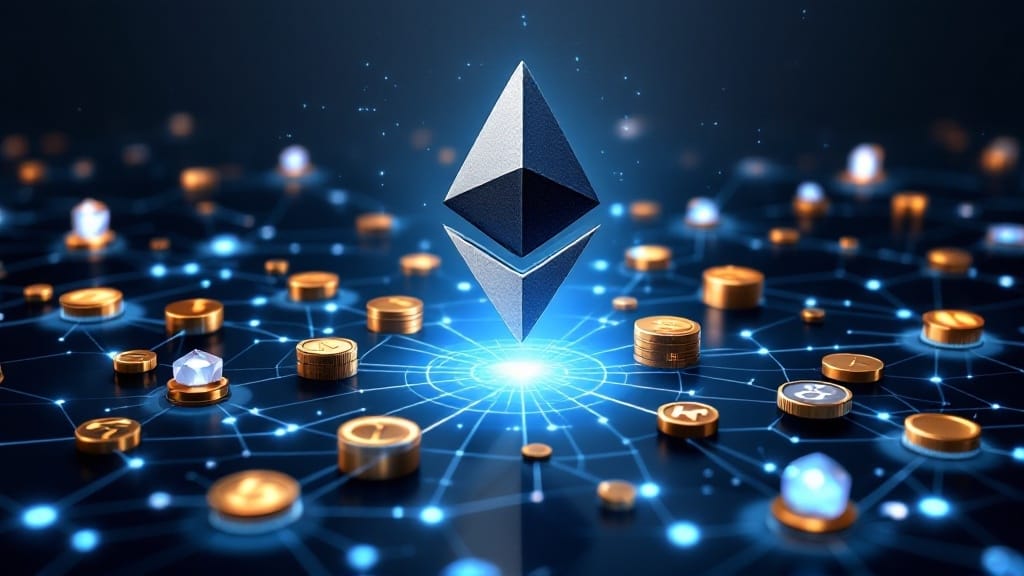Tokens are digital assets that operate on existing blockchain platforms through smart contracts, serving diverse functions beyond basic transactions. These programmable instruments can represent ownership rights, voting power, and access privileges within decentralized ecosystems, while being created through minting processes that define parameters like total supply and distribution mechanisms. Different token types include utility tokens for platform access, governance tokens for organizational voting, and security tokens representing traditional assets, with their implementation continuing to transform financial markets and digital ownership models.

Innovation in blockchain technology has given rise to crypto tokens, a distinctive class of digital assets that operate on existing blockchain platforms and serve multiple functions beyond simple transactions. Unlike cryptocurrencies, which operate on their own blockchain networks, tokens are created and managed through smart contracts on established platforms, with Ethereum being the most prominent example. These digital assets can represent different forms of value, from ownership rights and voting power to access privileges and financial instruments.
The creation of tokens occurs through a process called minting, which utilizes smart contracts to define specific parameters such as total supply, distribution mechanisms, and functionality. These tokens can be distributed through various methods, including Initial Coin Offerings (ICOs), Initial Exchange Offerings (IEOs), or Security Token Offerings (STOs), enabling projects to raise capital while providing participants with access to their ecosystem. Fan tokens have emerged as a unique category allowing supporters to participate in project decisions. The secure storage of tokens is crucial, with hardware wallets providing the highest level of protection for long-term holders.
Technical standards, such as ERC-20 for fungible tokens and ERC-721 for non-fungible tokens (NFTs), guarantee compatibility and interoperability within blockchain ecosystems. Smart contracts automate token interactions, enabling programmable functionality that can support complex operations in decentralized finance (DeFi), digital art marketplaces, and governance systems. The underlying blockchain infrastructure provides security through encryption protocols while maintaining transparency in all transactions.
Tokens serve a wide range of purposes in the crypto ecosystem, from representing traditional assets like stocks and bonds to enabling unique ownership of digital items in gaming and art. Governance tokens grant holders voting rights in decentralized autonomous organizations (DAOs), while utility tokens provide access to specific platform services or content. DeFi protocols like Uniswap and MakerDAO utilize governance tokens to ensure community-driven decision-making and platform development. The value of these tokens is typically determined by market forces of supply and demand, though some may have value tied to specific terms set during issuance.
The tokenization of assets has transformed financial markets by enabling fractional ownership, increasing liquidity, and expanding access to investment opportunities. This technology has particularly impacted areas such as real estate, art collection, and corporate governance, where traditional markets often face barriers to entry and limited accessibility.
FAQs
How Do I Protect My Crypto Tokens From Hackers and Scammers?
Protecting cryptocurrency tokens requires a multi-layered security approach focused on three critical areas.
Users should utilize cold storage through hardware wallets for long-term holdings, enable two-factor authentication on all accounts, and conduct transactions exclusively through regulated exchanges.
Furthermore, implementing strong passwords, regularly monitoring account activity, and staying informed about common scam tactics greatly reduces vulnerability to cyber threats.
Can Tokens Be Converted Directly to Traditional Currency Like Dollars or Euros?
Direct conversion of crypto tokens to traditional currencies typically requires intermediary steps through cryptocurrency exchanges.
Most tokens must initially be converted to a major cryptocurrency like Bitcoin or Ethereum, which can then be exchanged for fiat currency.
While some exchanges offer direct token-to-fiat pairs, these are limited and often come with higher fees, regulatory requirements, and longer processing times compared to standard crypto-to-crypto conversions.
What Determines a Token’s Market Value and Price Fluctuations?
A token’s market value is determined by multiple interconnected factors, including supply and demand dynamics, user adoption rates, and technological innovation.
Market sentiment, influenced by social media and news coverage, can trigger significant price movements, while regulatory developments often impact investor confidence.
Furthermore, the token’s utility, governance structure, and integration with existing systems play vital roles in determining its general value and price fluctuations.
Are Crypto Tokens Regulated by Government Financial Authorities?
Crypto tokens face varying levels of government regulation worldwide, with oversight primarily from financial authorities like the SEC and CFTC in the United States.
The regulatory framework depends on token classification: security tokens fall under securities laws, utility tokens may face lighter oversight, while stablecoins attract specific regulations.
Many jurisdictions are still developing extensive regulatory approaches, creating a complex landscape where compliance requirements differ markedly between countries.
Which Wallets Are Best for Storing Different Types of Tokens?
For maximum security, hardware wallets like Ledger and Trezor excel at storing diverse token types through offline private key protection.
MetaMask specializes in ERC-20 and Ethereum-based tokens, while Phantom Wallet optimizes Solana token management.
Hot wallets such as Coinbase and Exodus offer convenient multi-token support with robust security features, though they’re more vulnerable to online threats than cold storage solutions.









